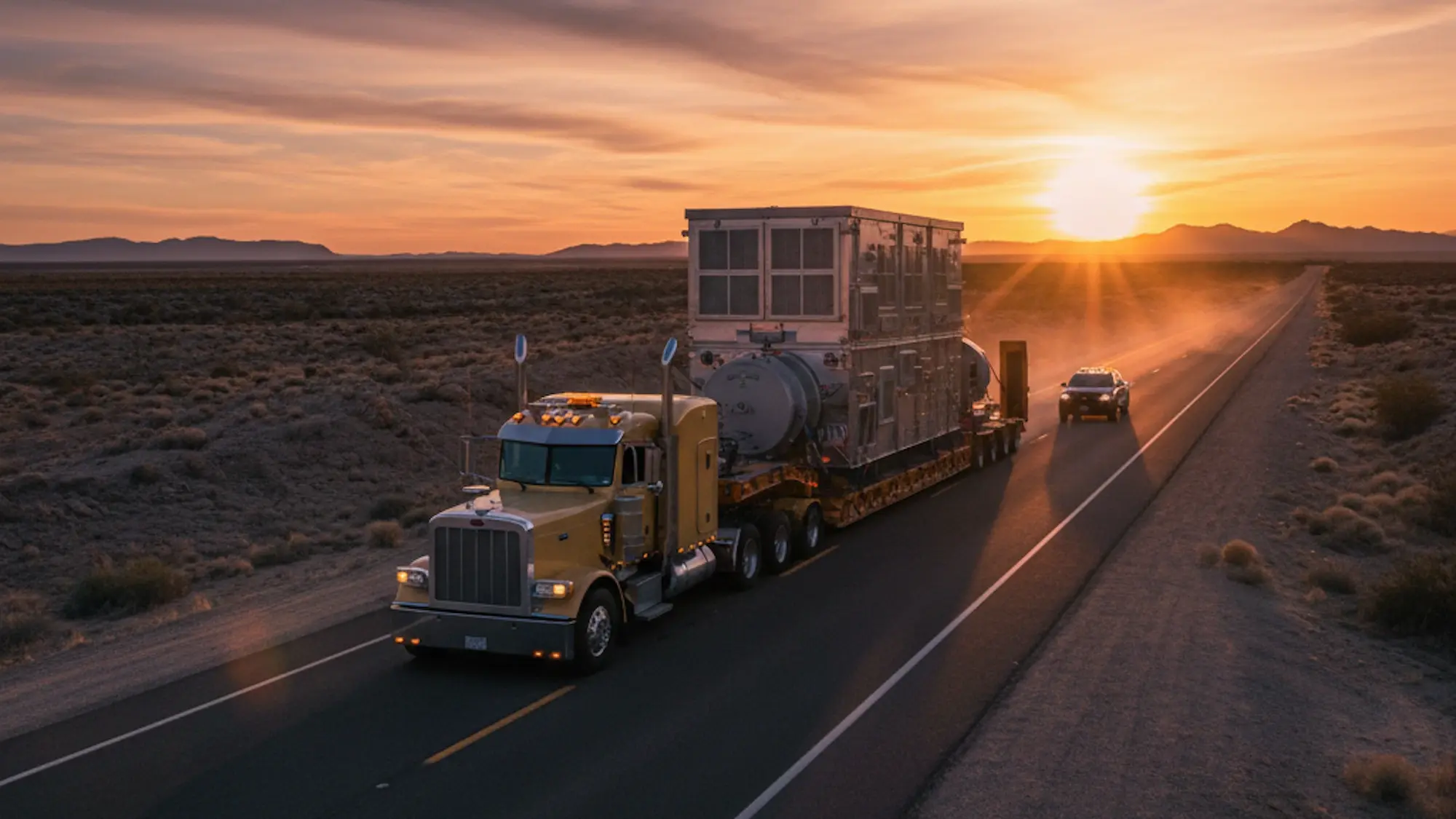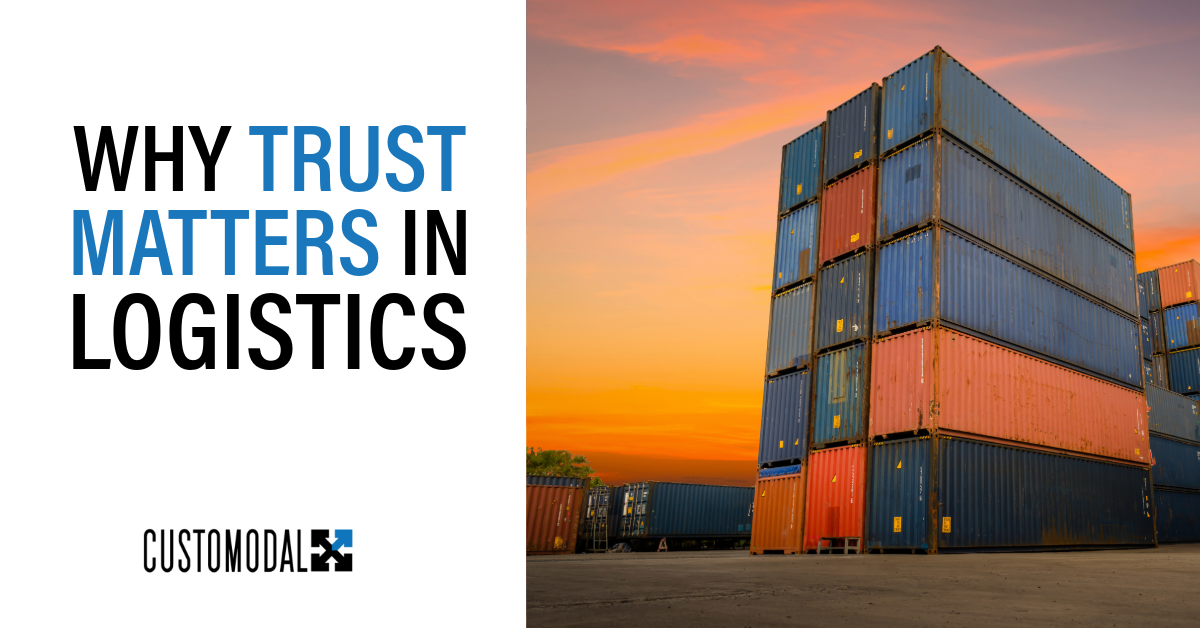
Defining the 'Special' in Specialized Freight
When a new, highly customized $2 million generator needs to be moved across five states to power a critical infrastructure project, is it just "freight"? Or is it, in reality, a mission-critical operation that determines the project's entire timeline and budget?
For companies in the energy, utility, and heavy construction sectors, the answer is always the latter. The cargo that builds, powers, and maintains modern infrastructure is unique—it is often oversized, overweight, highly fragile, and tied to non-negotiable deadlines. This is why standard logistics is not enough. This is where the discipline of Specialized Freight Management (SFM) comes into play.
Specialized Freight Management is not simply a trucking service; it is the comprehensive, end-to-end discipline focused on the meticulous planning, coordinated execution, and rigorous auditing of logistics for high-value, highly regulated, or physically unique cargo. It is a crucial element of the industrial supply chain that moves assets too big, too complex, or too important for standard carriers to handle.
In short, SFM is project management and risk mitigation integrated into the supply chain. Its primary goal is to minimize the exposure that comes from shipping the assets your entire business—or the public it serves—depends on. If you work in an industry where delays are measured not just in dollars but in operational shutdowns and contract failures, understanding SFM is essential for preserving your uptime and protecting your bottom line.
The Unique Characteristics of Specialized Freight
To truly grasp the necessity of Specialized Freight Management, you must first understand why the cargo itself breaks the mold of conventional shipping. The freight you move is often in a class entirely of its own, presenting a unique matrix of challenges.
1. Oversize & Overweight (OOG): Beyond the Standard Pallet
Your assets routinely exceed the legal maximum limits for height, width, length, or weight (known as out-of-gauge or OOG cargo). These are not palletized goods; they are massive infrastructure components.
Think of items like a wind turbine blade, which can stretch over 200 feet, or a complex generator housing for a utility plant. These components require more than just a standard flatbed. They demand specialized, purpose-built equipment, such as step deck trailers, double drops, or multi-axle heavy haul transportation systems designed specifically to keep the center of gravity low and distribute extreme weight safely.
Moreover, every OOG move triggers a cascade of logistical requirements that turn a simple transport into a complex road project:
-
Route Surveys: Detailed pre-trip analyses to verify bridge clearances, check for road construction, and confirm turning radius accessibility.
-
Pilot Cars & Escorts: Mandated safety vehicles to guide the load and manage traffic flow.
-
Permitting: As discussed below, this is a distinct and often lengthy process.
For those focused on heavy construction logistics, shipping a massive excavator or a prefabricated bridge section is the norm, not the exception, and each move carries the risk of a seven-figure delay if handled improperly.
2. Time & Mission-Criticality: The Cost of Waiting
In the energy and utility sectors, specialized freight is virtually always tied to a major project milestone. This cargo is not sitting in a warehouse; it is the component needed for a scheduled plant turnaround, an essential repair following equipment failure, or the final piece of a new wind farm. This makes the freight mission-critical.
This is where the costs of generic logistics truly become apparent. Studies on industrial downtime reveal staggering figures:
The median cost of an unplanned industrial outage can reach nearly $125,000 per hour, according to one survey of maintenance decision-makers across various sectors, including energy and utilities.
When a specialized valve or transformer is delayed, the financial exposure compounds minute by minute as field crews wait and project timelines stretch. For example:
A single, critical outage in the utility sector can cost $300,000 per hour in lost revenue and recovery costs.
In SFM, the value of the service is ultimately measured by its ability to prevent this crippling downtime.
3. High Value, Fragility, and Handling Needs
The cargo in specialized freight management is intrinsically high value—either highly customized, extremely expensive, or both. A proprietary piece of mining equipment or a high-tech control system for a pipeline cannot simply be replaced if damaged.
SFM requires carriers with specific capabilities:
-
Air-Ride Suspension: To mitigate road vibration and protect sensitive equipment from internal damage.
-
Specialized Loading: Using gantry systems or cranes, rather than standard forklifts, to ensure the load's structural integrity is never compromised.
4. Regulatory Complexity: The Compliance Maze
Transporting specialized freight involves a labyrinth of regulatory hurdles that general carriers are ill-equipped to navigate. This is particularly true for sectors that routinely deal with complex materials, such as the energy sector's reliance on Hazmat materials, or the need for intricate, often cross-border permitting for OOG loads.
The permitting process alone is a major undertaking. Securing the necessary permits for an oversize cargo logistics move across just a few states can require coordinating with dozens of state, county, and local jurisdictions. Each one has its own unique rules regarding vehicle dimensions, hours of operation, and even bridge weight thresholds.
According to transport industry data, 6% of the roughly 10 billion tons of freight moved annually in the U.S. is considered oversized or overweight, and managing the permits for this fraction of the freight is exponentially more complex than managing the rest.
Why Standard Freight Management Fails Mission-Critical Projects
If you have ever attempted to use a standard Less-Than-Truckload (LTL) or Full-Truckload (FTL) system for specialized freight, you already know the disconnect. These systems are built for uniformity, high volume, and speed—they are fundamentally incompatible with the custom nature and high-stakes environment of project cargo management.
Standardization vs. Customization
General freight networks operate like a massive, automated assembly line, optimized for cargo that is predictable and easily stackable. Your project's highly customized, short-run manufactured parts or unique infrastructure components are the wrench in that machine.
-
The LTL Model: LTL works by consolidating freight. Oversized cargo cannot be easily consolidated, resulting in steep, often inconsistent fees and a high probability of delays as the carrier tries to work your complex load around its standard operation.
-
Lack of Flexibility: Standard systems lack the ability to quickly pivot based on an unexpected roadblock, a sudden need for a different trailer type, or a required last-minute route adjustment. The process is rigid, but the real-world conditions for heavy haul transportation are anything but.
The Visibility Blackout
Standard systems are notorious for creating a "visibility blackout" once a shipment deviates from the norm. General tracking often ends where the standard route ends, or when the freight requires transloading or unique handling.
For a construction manager coordinating crane crews and installation teams, losing visibility on a massive turbine component is a disaster. You need real-time, minute-by-minute status updates—not just a generic "in transit" message—to prevent your on-site labor from sitting idle. This lack of granular, real-time data from general systems introduces unacceptable risk to utility logistics and large-scale industrial projects.
The Hidden Cost of General Brokers
Relying on a general freight broker is often one of the largest unrecognized risks in specialized freight. While a general broker may have access to a large network of carriers, they often lack the deep subject matter expertise required for specialized moves.
-
Insufficient Vetting: They may contract with a carrier that lacks the specific insurance limits, the proper low-deck trailer configuration, or the necessary driver certification for a specific oversize cargo move.
-
Hidden Fees and Delays: Inevitably, this lack of expertise leads to costly hidden fees when the contracted carrier realizes they cannot execute the move legally or safely and must transfer the load, creating delays that are far more expensive than any initial freight cost savings.
Specialized Freight Management: The Integrated Solution
Specialized Freight Management addresses every pain point by approaching logistics as a highly integrated, consultative service. It shifts the focus from moving a box to managing a critical project deliverable.
Integrated Project Planning: Strategy Before Shipment
SFM begins long before the load is ready. It involves a strategic assessment that includes:
-
Cargo Profiling: Detailed analysis of the asset's dimensions, weight distribution, and fragility.
-
Route Engineering: Not just a GPS route, but a specialized path verified for clearances, weight limits, and compliance restrictions.
-
Proactive Permitting: Starting the permit application process weeks in advance, managing communication with multiple state and local agencies, and handling all required paperwork.
This integrated approach ensures all potential risks—from a low bridge to a critical weather event—are identified and mitigated before the truck even leaves the yard.
Single-Source Accountability: Eliminating Complexity
The true value of a specialized partner is providing a single point of accountability for what is a genuinely complex undertaking. Instead of a client having to manage separate vendors for permitting, route surveying, specialized carrier vetting, and customs paperwork, specialized freight management consolidates the entire process.
Your partner becomes the expert who manages the entire logistical life cycle. This frees your internal team—whether you are focused on energy sector logistics or heavy mining operations—to concentrate on the core project, trusting that the single most complex part of the supply chain is being handled by a dedicated specialist.
Focus on Uptime and Reliability: The Real ROI
Ultimately, the goal of SFM is not to find the cheapest rate—it is to deliver an irreplaceable asset on time, every time. The return on investment (ROI) is realized in the massive savings gained from preventing operational downtime. When you ensure a critical asset arrives for a scheduled turnaround, you prevent a potential multi-million-dollar loss. SFM success is measured in hours of uptime secured, offering an incomparable return that far outweighs the cost of premium service.
Partnering with Specialized Expertise
For leaders in utilities, energy, and heavy industry, the complex, high-stakes nature of your assets and projects demands a logistics strategy that is equally sophisticated. Standard freight is not sufficient for your mission-critical freight needs. You require a partner whose expertise is defined by precision, proactive planning, and single-source control over every unique move.
Customodal is built specifically to meet these challenges. We leverage our deep industry experience to provide specialized freight management, ensuring that from initial planning to final delivery, your most valuable, complex, and high-risk cargo is handled with expert precision. By choosing a partner dedicated to eliminating risk and maximizing operational uptime, you protect your projects, your reputation, and your bottom line.





